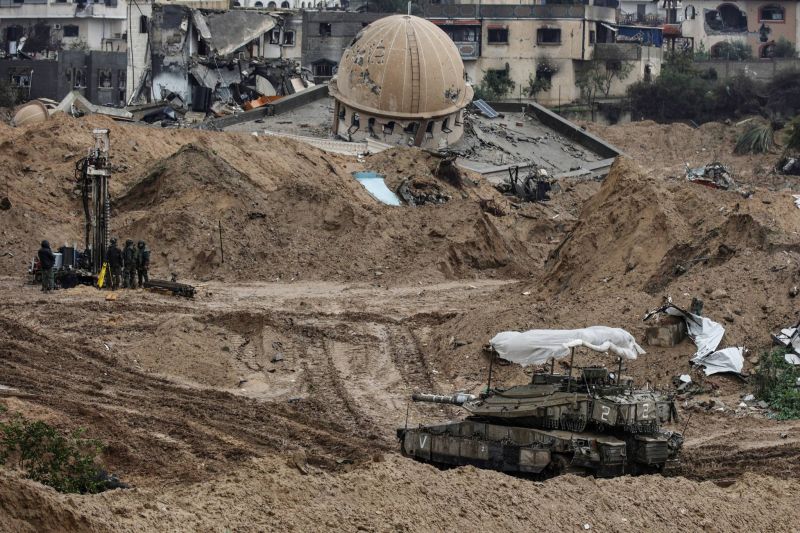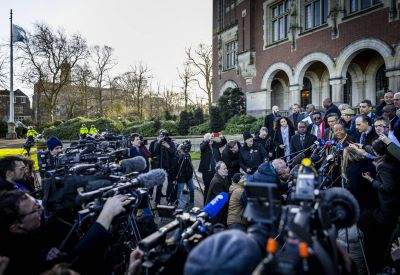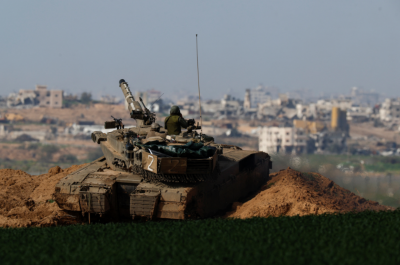
This picture taken during a media tour organized by the Israeli military on Jan. 27, 2024, shows an Israeli army tank rolling in Gaza's main southern city of Khan Yunis, amid continuing battles between Israel and Hamas. (Credit: Nicolas Garcia/AFP)
Following the collapse of November’s week-long cease-fire and hostage exchange, communication between Israel and Hamas disintegrated. Talk of reopened negotiations surfaced again in the last two weeks, despite what appears to be some serious roadblocks.
In the evening of Jan. 25, Israeli news outlet Haaretz reported a source familiar with the talks as saying that Hamas and Israel had reached a “basic agreement on the majority of the deal’s terms” — with one key issue stalling further negotiations: the guarantee of a cease-fire.
According to this source, the draft proposal includes a 35-day truce and those detained by both sides to be released. The criteria for the release of prisoners were determined, but their identities were not yet set. Israel believes there to be 132 hostages remaining in Gaza, including the bodies of at least 28 who died.
On Jan. 26, the International Court of Justice ruled in the case between South Africa and Israel, issuing a clear criticism of Israel’s actions in Gaza. The court order stops short of calling for a cease-fire, but states that Israel “must take all measures within its power to prevent … killing members of the group” and “causing serious bodily or mental harm to members of the group” — which could just as easily be interpreted as a call for a cease-fire, in so many words.
On Sunday, CIA Director William J. Burns, Mossad Chief David Barnea, Qatari Prime Minister Mohammed bin Abdulrahman Al Thani, and Egyptian intelligence chief Abbas Kamel met in Paris for further negotiations, having drafted a proposal that incorporates demands from both sides. The White House described these meetings as “constructive.”
It has yet to be seen how constructive they really were, seeing as Hamas has been firm on its refusal to agree to any hostage exchange before there is a guarantee of a complete end to Israeli military operations in Gaza, while Netanyahu’s government has made it clear that Israel would continue its war on Gaza until it achieves Hamas’ complete destruction.
The Wall Street Journal has reported several times on the Israeli army’s limited progress in this regard as it falls behind on its four-stage plan to “crush” Hamas.
On Monday, Qatar's prime minister announced that Sunday's meetings had indeed resulted in the framework for a phased truce, which he described as "good progress," and said he would be relaying it to Hamas.
Here is what we know about what each side is demanding — and refusing — based mostly on recent reporting from Reuters and Haaretz, whose teams of journalists spoke with several sources in the region, many of whom only consented to interviews on the condition of anonymity.
What does Israel want?
On Dec. 28, Qatar sent the framework for a new agreement to both Israel and Hamas, asking both parties to indicate their demands. Israel’s response was the release of all hostages within the time-frame of several weeks.
On Jan. 23, Israeli government spokesperson Eylon Levy told a press conference that Israel would not agree to a cease-fire deal that leaves Hamas in power in Gaza.
On that same day, an audio recording was released, as reported by several Israeli outlets, in which Netanyahu expresses his distrust for Qatar and even calls the key negotiators “problematic,” and accusing them of funding Hamas.
"You don't hear me thanking Qatar ... It is essentially no different from the UN or Red Cross, and in a certain sense is even more problematic — I have no illusions about them,” he said.
Five sources privy to negotiations say Israel has refused to discuss any cessation of hostilities that did not include Hamas being dismantled in some way. They did not specify whether exiling Hamas’ Gaza leadership from the enclave counts as “dismantling.”
An anonymous senior Hamas official told Reuters that Israel had made an offer to end the war if six of Hamas’ senior leaders in Gaza are removed from the Strip – which Hamas rejected outright.
A Palestinian official close to mediation efforts described Israel as seeking to negotiate one stage at a time, likely beginning with the release of civilian hostages.
On Jan. 25, The Washington Post reported on an Israeli proposal that includes a 60-day pause in fighting in exchange for the gradual release of over 100 hostages, starting with women and children, then men, soldiers, and the bodies of those who died while held captive in Gaza.
What does Hamas want?
Hamas has demanded a complete withdrawal of Israeli forces from the enclave in return for the release of remaining hostages. On Monday, AFP quoted senior Hamas official Taher al-Nunu as saying "We are talking first of all about a complete and comprehensive cease-fire, and not a temporary truce." In the interview he specified that once the fighting stops "the rest of the details can be discussed" including hostage release.
The group’s initial response to Qatar’s December initiative toward mediation was to indicate it was seeking a truce that would last for several months. Following this initial proposal, sources say progress was made towards getting both parties to agree on a 30-day truce. The latest reports have anonymous sources hinting at an agreement on a 35-day truce.
However, this progress stalled since Hamas has refused to move forward with the plans until the future conditions of a permanent cease-fire are agreed, according to six sources.
Senior Hamas spokesperson Abu Zuhri told Reuters: "We are open to all initiatives and proposals, but any agreement must be based on ending the aggression and the occupation's complete pullout from Gaza Strip.”
According to a Palestinian official speaking to Reuters, Hamas wants the United States, Egypt and Qatar to guarantee the cease-fire’s implementation and is concerned that Netanyahu's government will resume fighting as soon as Hamas frees civilian hostages, even if Israeli soldiers remain captive.
According to reports from The Guardian, Hamas has repeatedly refused any deal that does not include a permanent cease-fire. The UK newspaper also cited a source with knowledge of the discussions as saying that the current strategy among mediators is to implement a system of phased cease-fires and hostage releases “to build confidence,” between the two parties.
In an earlier round of negotiations, Hamas sought the release of all Palestinian prisoners from Israel's prisons, including those who participated in the Oct. 7 attacks, but has since softened the demand, likely vehemently opposed to by Israel, an American source told Reuters.

